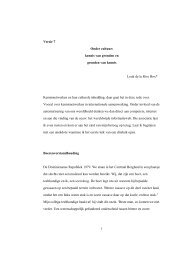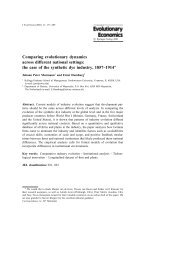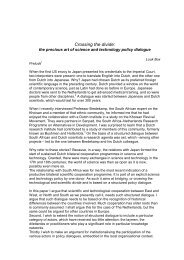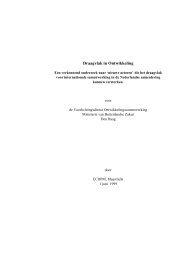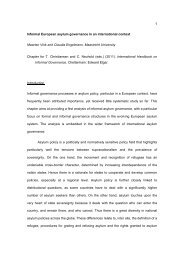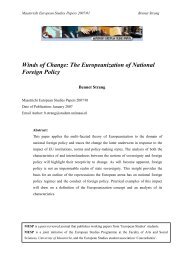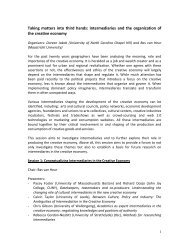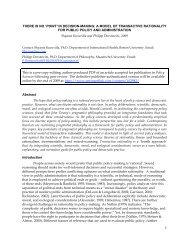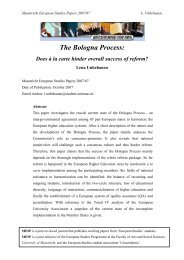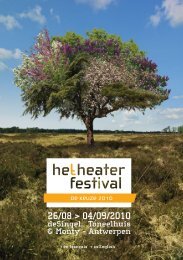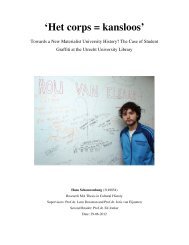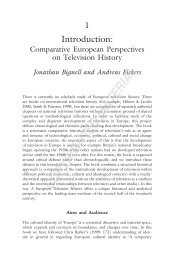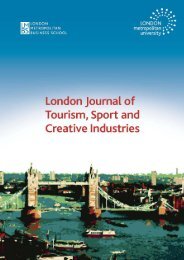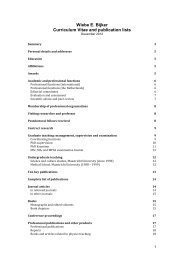ESST MA.pdf - Maastricht University
ESST MA.pdf - Maastricht University
ESST MA.pdf - Maastricht University
You also want an ePaper? Increase the reach of your titles
YUMPU automatically turns print PDFs into web optimized ePapers that Google loves.
<strong>MA</strong> European Studies on Society, Science<br />
and Technology | 2008<br />
Language of<br />
instruction:<br />
English
A European university<br />
with an international outlook<br />
<strong>Maastricht</strong> <strong>University</strong> (UM) is a European university with a strong<br />
international outlook. Cherishing and stimulating talented people<br />
and creating opportunities for innovative education and research<br />
relevant to today’s society are core values of UM.<br />
Its location in <strong>Maastricht</strong>, one of the oldest and most beautiful cities in the Netherlands, puts<br />
UM at the crossroads of different cultures and in the heart of Europe. The city is known for the<br />
<strong>Maastricht</strong> Treaty, which marked the establishment of the European Union. At UM, you encounter<br />
the spirit of Europe. We recognise the strength in people from a variety of backgrounds joining<br />
forces to generate ideas and solve social problems. In today’s world, issues and problems are too<br />
complex to be understood from a narrow perspective. Because of that, we make sure that the<br />
education and research programmes at UM are not bound by disciplinary or national frontiers.<br />
You are given the scope to develop your own talents and interests within a cooperative<br />
international framework.<br />
Thus, it is no coincidence that UM has evolved into the most international university in the<br />
Netherlands. More than half of our master’s students and one-fourth of our academic staff<br />
come from outside the Netherlands, and the majority of master’s programmes are taught in<br />
English. In addition, most of the education and research has a strictly international orientation.<br />
The educa tional programmes at UM use Problem-Based Learning, which focuses on small groups<br />
and informal contacts between the academic staff and students. The combination of this teaching<br />
method and an international student population means that students have plenty of opportunities<br />
to acquire knowledge and experience from a range of different perspectives. All this offers you an<br />
international environment in which you study, live and often build lifelong friendships with other<br />
students from a variety of cultures and backgrounds.<br />
2 Master’s programme in Arts & Culture and Social & Political Sciences | 2008
<strong>MA</strong> European Studies on Society, Science and Technology (<strong>ESST</strong>)<br />
<strong>ESST</strong> is an international master’s programme on governance and cultures of innovation<br />
Introduction<br />
The emergence and diffusion of new technologies – such as<br />
the Internet, genetic engineering, nanotechnology and<br />
alternative energy production – opens up both opportunities<br />
and threats to modern societies and economies. Citizens,<br />
governments, universities and businesses face great<br />
challenges when trying to take advantage of the seemingly<br />
infi nite opportunities that scientifi c and technological<br />
development offer. There is an increasing need for experts<br />
capable of dealing with the complexities of modern societies<br />
in a refl exive and politically conscious manner. The graduates<br />
of the <strong>ESST</strong> programme are thus well prepared for a wide<br />
spectrum of professional activities in research and policy<br />
institutions, NGOs, or private companies. <strong>ESST</strong> also prepares<br />
students to follow a subsequent PhD programme.<br />
Profi le<br />
The focus of the programme is on the governance and<br />
cultures of innovation of contemporary societies with its<br />
scientifi c and technological innovations as its main driving<br />
force. In the <strong>ESST</strong> programme students refl ect on the arenas<br />
in which controversial issues are discussed, like,<br />
biotechnology, genetics, sustainable technology, climate<br />
change, biodiversity and the globalisation of economics, and<br />
technology transfer. We will explore this issue from different<br />
angles. We will, for instance, refl ect critically on the ‘common<br />
sense’ views of the making and use of new technologies and<br />
scientifi c claims. Science and technology do not merely assist<br />
us in our everyday lives; they are also powerful forces acting<br />
to reshape our activities and their meanings. They shape, for<br />
instance, mobility patterns and gender, to the standardisation<br />
of practices in health care and telecom. Mobile<br />
phones have changed notions of time and place, public and<br />
private sphere; genetic engineering has redefi ned our<br />
understanding of life and family planning. There is a reciprocal<br />
cultural infl uence on science, technology too. Thus we can<br />
only hope to understand science and technology when we<br />
acknowledge their cultural basis.<br />
An important question is how we can contribute to some<br />
sort of democratic control of science and technology<br />
development, while at the same time using them to help<br />
solve some of the pressing problems of our complex modern<br />
societies? Therefore, we will look at the role of these<br />
<strong>Maastricht</strong> <strong>University</strong> is a signatory of the “Code of conduct with respect to<br />
international students in Dutch higher education”. More information about<br />
this code of conduct is available at www.internationalstudy.nl<br />
The programme in this brochure is accredited by the Accreditation<br />
Organisation of the Netherlands and Flanders (NVAO).<br />
For more information on NVAO, please visit www.nvao.nl<br />
innovations as a focus of governance. By governance we<br />
mean more than just the activities of formal political<br />
authorities. Governance implies the whole set of arrangements<br />
and procedures through which the development of<br />
science and technology is monitored and controlled. These<br />
arrangements try to cope with the various challenges that<br />
are implied by innovation. For instance, how can policyinstitutions<br />
deal both effectively and democratically with<br />
the risks and moral dilemmas of new technological<br />
developments such as genetic food, biomedicine, and<br />
information or communication technology? Does the<br />
transfer of new technologies to developing countries<br />
increase their dependency of the North? What role do local<br />
and supra-local institutions play in facilitating or curtailing<br />
attempts to close the gap? From a policy perspective a need<br />
has been felt to better understand the cultures of innovation<br />
and to determine how, through policy measures, this process<br />
may be strengthened to provide impetus for sustained<br />
economic growth. For economists and policy-makers science<br />
and technological capabilities of a country are important<br />
premises for structural change, development and economic<br />
growth. Moving beyond the narrow and mechanistic<br />
confi nes of mainstream economics, evolutionary and<br />
institutional economics provide systemic perspectives on the<br />
problem of economic development. Therefore, in the <strong>ESST</strong><br />
programme you will examine also the dynamics of science<br />
and technology, and their interaction from an economics<br />
and policy perspective.<br />
• Dutch Accreditation Committee qualifi cation 2006: ‘Excellent’.<br />
• <strong>ESST</strong> is an international master’s programme, exchanging students<br />
and staff from 14 European partner universities.<br />
• <strong>ESST</strong> is a programme with a maximum number of approximately<br />
30 students.<br />
• <strong>ESST</strong> draws upon 15 years of experience (est. 1992).<br />
• The <strong>ESST</strong> programme is based in the interdisciplinary fi eld of<br />
Science and Technology Studies (STS) and Science, Technology and<br />
Innovation Studies (ST&I).<br />
Aims and Objectives<br />
Governmental, non-governmental and private, corporate<br />
3
organisations are increasingly faced with rapidly changing<br />
decision-making conditions. In a period that is heading<br />
towards an ever more complex information society, there<br />
will be an increasing need for interdisciplinary trained people<br />
who are able to deal with our cultures of innovation in a<br />
refl exive and politically conscious way. The global,<br />
multicultural, and environmentally conscious perspective of<br />
<strong>ESST</strong> is aimed at developing ethical awareness and public<br />
responsibility in the knowledge society.<br />
The <strong>ESST</strong> programme explores:<br />
• Political and cultural analysis of the modern knowledge<br />
society<br />
• Social and economic analysis of different cultures of<br />
innovation<br />
• Ethical refl ection on scientifi c and technological<br />
development<br />
Overview of the Programme<br />
The programme is integrated into a network of 13<br />
universities all over Europe. It covers 12 months of full-time<br />
study and is divided into two semesters. The fi rst semester<br />
consists of fi ve modules of intensive coursework. During the<br />
second semester, students write a thesis in an area of<br />
specialisation offered by one of the <strong>ESST</strong> universities. In most<br />
cases, this will involve moving to one of the partner<br />
universities in Europe.<br />
First Semester<br />
Module 1: Introduction in Society, Science and Technology<br />
Studies (3 weeks, 5 ECTS)<br />
This course offers an introduction to Science and Technology<br />
Studies (STS). It will introduce you to the multiple ways in<br />
which science and technology, individuals and institutions<br />
mutually shape one another to the benefi t and sometimes<br />
detriment of society. In this course, we take a ‘critical’<br />
approach to perspectives on the relation between science<br />
and technology, and society. By this, we don’t mean being<br />
negative about science and technology. However, like a good<br />
movie critic, we will focus on developing your ability to judge<br />
the good and bad aspects of science and technology.<br />
4 Master’s programme in Arts & Culture and Social & Political Sciences | 2008<br />
Module 2: Science and Technology in the Making<br />
(3 weeks, 5 ECTS)<br />
The aim of module 2 is to illustrate the complexities involved<br />
in the processes of establishing scientifi c facts. You will be<br />
introduced to the way research programmes are set up and<br />
how they involve negotiations, translations of interests, and<br />
have political as well as cultural relevance. Therefore,<br />
discussions are centered on different aspects of science in<br />
action, such as commercialisation, politics, skills, role of<br />
machines, strategies, choices, patents, ethical confl icts,<br />
controversies, innovations etc. The module includes actual<br />
observations in a laboratory.<br />
Module 3: Interpreting the History of Science and<br />
Technology (3 weeks, 5 ECTS)<br />
Module 3 examines how important innovations of the past<br />
may be interpreted. It explores what a historical approach<br />
can contribute to the understanding of scientifi c and<br />
technological development. The module focuses on two<br />
major transformations in the emergence of modern society:<br />
1. The Scientifi c Revolution of the 17th century, which<br />
established the most important features of present-day<br />
science (experiments, laboratories, mathematical and<br />
mechanistic ways of explanation); and 2. The Industrial<br />
Revolution of the 19th century, which created modern<br />
industrial society (labour relations, consumer products, a<br />
new kind of economy). Several perspectives from which<br />
these developments can be understood are analysed and<br />
compared.<br />
Module 4: Science and Technology Dynamics<br />
(3 weeks, 5 ECTS)<br />
This module examines the implications of changing<br />
government-university-industry relations on the scientifi c<br />
and technological knowledge base. It is designed to engage<br />
also students with a non-economic background into<br />
numerous heterodox economic approaches to understanding<br />
technological change. After an introduction to the<br />
foundations of orthodox economics and familiarisation with<br />
basic quantitative techniques, the students are introduced to<br />
topics including: evolutionary approaches to economics;<br />
network analysis; intellectual property rights; technological<br />
transitions and system innovation; institutional analysis of<br />
economic change and the policy-making process.<br />
Module 5: The Politics of Knowledge (3 weeks, 5 ECTS)<br />
Module 5 introduces you to issues related to the governance<br />
of today’s knowledge society. Subjects dealt with in this<br />
module include: the politics of science and technology,<br />
technology and democracy, risk society, the role of the<br />
government, the media and experts, the public in the<br />
governance of knowledge, constructive technology<br />
assessment and environmental controversies. In this<br />
module, the politics of facts and artifacts as well as the<br />
policy of science and technology will be discussed.<br />
Second Semester<br />
Research and Thesis (30 ECTS)<br />
The second semester is spent at the home-university or at<br />
one of the partner universities of the <strong>ESST</strong>-network, to study<br />
your fi eld of interest in greater depth. You receive a six-week
introductory course (8 ECTS) into your specialisation and<br />
spend the remaining time writing your master‘s thesis<br />
(22 ECTS) on a topic of your choice. A member of the <strong>ESST</strong><br />
teaching staff will be appointed as your supervisor. The<br />
member universities of the <strong>ESST</strong> network offer one or more<br />
specialisations, according to the universities’ own research<br />
interests and teaching resources. <strong>Maastricht</strong> <strong>University</strong><br />
offers the specialisations ‘Technological Culture’ and<br />
“Bridging the Technological Divide”. For information on the<br />
content and the most updated version of the specialisations<br />
available see the <strong>ESST</strong> website: www.esst.unimaas.nl.<br />
Some of the theses written in the <strong>ESST</strong> programme are:<br />
• Democratisation of Europe: European citizenship, science &<br />
technology and the question of participation<br />
• Governing in uncertainty: the precautionary principle<br />
applied to GMO’s<br />
• Patents, pharmaceuticals and politics: South Africa’s<br />
struggle for affordable AIDS medication<br />
• Tripping In: How the TRIPs Agreement will infl uence<br />
innovation in the pharmaceutical sector<br />
• The Ethiopian innovation system with particular emphasis<br />
to the National Agricultural Research System<br />
• Architecture and ideology: architecture of public buildings<br />
in Ankara, 1920-1950 (see for more examples:<br />
www.esst.unimaas.nl)<br />
Some examples of second semester specialisations are:<br />
• Innovation Systems, Social and Ecological Change<br />
• Bridging the Technological Divide<br />
• Innovation Strategies to Catch Up<br />
• Social Perspectives on Technological Risks<br />
• E-government and E-democracy<br />
• Science, Entrepreneurship and Innovation in Time<br />
and Space<br />
• Innovation and Economical Development in the New<br />
Europe<br />
• Medical Technologies of Sex and Gender<br />
• Biotechnology, Biodiversity, Expertise and Governance<br />
• Globalisation, Innovation and Policy<br />
Special Programme Features<br />
• In the Netherlands, the <strong>ESST</strong> programme is offered by the<br />
Faculty of Arts and Social Sciences at <strong>Maastricht</strong> <strong>University</strong>,<br />
which is a centre of excellence in the fi eld of Science and<br />
Technology Studies. Students will be advised by a dynamic<br />
group of teachers, including world-leading scholars.<br />
• <strong>ESST</strong> students have different disciplinary and cultural<br />
backgrounds; therefore <strong>ESST</strong> is interdisciplinary and<br />
international.<br />
• In the second semester, students move to one of the<br />
universities in the programme’s international network to<br />
do research and write their thesis.<br />
• In some specialisations, it is possible to combine research<br />
activities with an internship. In <strong>Maastricht</strong>, for example,<br />
students can do an internship at the Institute for<br />
Rehabilitation Research and at the International Centre for<br />
Integrative Studies.<br />
<strong>ESST</strong> member universities who offer the <strong>ESST</strong> master’s programme<br />
include the following:<br />
• Université Louis Pasteur, Strasbourg (France)<br />
• Aalborg <strong>University</strong> (Denmark)<br />
• Linköping <strong>University</strong> (Sweden)<br />
• Technical <strong>University</strong> of Lisbon (Portugal)<br />
• Université Catholique de Louvain (Belgium)<br />
• Lund <strong>University</strong> (Sweden)<br />
• <strong>Maastricht</strong> <strong>University</strong> (The Netherlands)<br />
• Universidad Autonoma de Madrid (Spain)<br />
• Facultés Universitaires Notre Dame de la Paix, Namur (Belgium)<br />
• <strong>University</strong> of Oslo (Norway)<br />
• Roskilde <strong>University</strong> Centre (Denmark)<br />
• <strong>University</strong> of Athens (Greece)<br />
• <strong>University</strong> of East-London (Britain)<br />
• Technical <strong>University</strong> of Lisbon (Portugal)<br />
Student Profi le<br />
I have a BA degree in Health Science and wrote<br />
a master’s thesis on the emergence and value<br />
of scientifi c facts in art research. Now I am<br />
doing an internship in the research<br />
department of the Institute for Cultural<br />
Heritage in Amsterdam and plan to continue<br />
as a PhD-student in this fi eld. I used <strong>ESST</strong> to do<br />
something completely different than the fi eld<br />
I was trained in during my bachelors. But<br />
some of my classmates used the programme<br />
to intensify the knowledge of their own fi eld.<br />
They had, for example, a background in<br />
international business and continued the<br />
training by choosing an <strong>ESST</strong>-specialisation in<br />
the fi eld of Science, Technology and<br />
Innovation Studies. In this way the <strong>ESST</strong><br />
programme fi ts both kinds of motivations.<br />
Matthijs Versteegh, The Netherlands<br />
Master’s student European Studies on Society,<br />
Science and Technology<br />
The programme is looking for students with an interest in<br />
policy, sociology and philosophy of science and technology,<br />
history, economics and innovation related issues. The<br />
programme is open to students with academic backgrounds<br />
in the social sciences, natural sciences, engineering and<br />
humanities.<br />
5
Career Perspectives<br />
The programme’s graduates will be well-equipped to find<br />
employment as science and technology managers, advisors,<br />
consultants, researchers, engineers, journalists, etc.<br />
Employers include all kinds of governmental institutions,<br />
NGOs, or private companies that deal with issues such as<br />
research funding, technological development, public health<br />
and medicine, environmental policy, technological risk<br />
management or organisational development.<br />
The programme provides them with first class competence<br />
to analyse and influence society’s and economy’s response to<br />
the challenges posed by scientific and technological change.<br />
Upon successful completion of this programme, students<br />
will be qualified for one or more of the following options:<br />
• Enrolment in the second-year of the two-year researchmaster’s<br />
CAST at <strong>Maastricht</strong> <strong>University</strong>.<br />
• Further research (PhD-trajectory).<br />
• Employment in public services or business management,<br />
with special expertise in the relations of science,<br />
technology, economy, and society at large. Examples of<br />
relevant organisations include advisory councils for science<br />
and innovation policy; energy research centres; health<br />
councils; advisory councils on spatial planning, nature and<br />
the environment; ministries; large international<br />
corporations.<br />
Admissions<br />
As enrolment numbers are limited to approximately 30<br />
students, admission is based on merit as assessed by the<br />
Board of Admissions.<br />
Admissions Requirements and Criteria<br />
• A bachelor’s degree from a relevant academic field<br />
• A letter of motivation<br />
• An IELTS test with a minimum score of 7.0 or TOEFL iBT with a<br />
minimum score of 100<br />
• Essay on a topic relevant to the interrelation between society,<br />
science and technology<br />
• Evidence of interdisciplinary interest<br />
Further Information on the application and registration<br />
procedure can be found on page 6 of this brochure or via<br />
www.unimaas.nl/masters.<br />
Master’s Meeting:<br />
Wednesday, March 5th 2008<br />
The master’s meeting is organised to provide you with presen-<br />
tations on the current content of the master’s programmes.<br />
During this event, you will be introduced to various features of<br />
studying at our faculty, such as our renowned Problem-Based<br />
Learning approach. Current master’s students will tell you<br />
about their experiences and answer your questions. For more<br />
information, see www.unimaas.nl/masters.<br />
6 Master’s programme in Arts & Culture and Social & Political Sciences | 2008<br />
How to Apply<br />
Application Procedure<br />
If you fulfil the admissions requirements for the master’s<br />
programme of your choice, you will need to submit a number<br />
of documents to the Board of Admissions (each programme<br />
has its own Board of Admissions for the selection of students).<br />
In addition, you will have to submit a completed application<br />
form that can be found on our website. You can also find the<br />
address for application submission on the website.<br />
Deadline for Application<br />
The application deadline to start in September 2008 will be:<br />
June 1, 2008 for EU/EEA students<br />
April 1, 2008 for students that require a visa<br />
or residence permit<br />
Tuition fees<br />
The Executive Board of <strong>Maastricht</strong> <strong>University</strong> will determine<br />
the tuition fees for the academic year 2008/2009 at the<br />
beginning of 2008, and will then be published at<br />
www.unimaas.nl.<br />
In the academic year 2007/2008 the following standard<br />
amounts were charged:<br />
• Master’s students under the age of 30 from EEA countries:<br />
€ 1,538<br />
• Master’s students above the age of 30 from EEA countries:<br />
€ 2,058<br />
• Master’s students from non-EU countries: € 11,500<br />
These fees serve as a reasonable indication of the fees for the<br />
2008/2009 academic year. Please consult the above website<br />
for other fees and the latest information.<br />
Scholarships<br />
There are a number of scholarship programmes available to<br />
prospective master’s students, according to academic back-<br />
ground and nationality. Information on scholarships and<br />
funding is available on the university’s website under the<br />
‘Practical Matters’ section for prospective master’s students,<br />
accessible directly from the university’s homepage, and at<br />
http://www.ssc.unimaas.nl/ under Finances and Insurances.<br />
Further information on the application and registration<br />
procedure can be found at: www.unimaas.nl/masters.<br />
<strong>Maastricht</strong> <strong>University</strong> and our faculty also regularly attend<br />
student fairs abroad. To see when we will be visiting your<br />
country, please check: www.unimaas.nl.
Overview<br />
master’s programmes 2008<br />
Arts & Culture<br />
• Arts and Heritage: Policy, Management and Education /<br />
Cultuur: Beleid, Behoud en Beheer (<strong>MA</strong>) 3<br />
• Arts and Sciences / Cultuur- en Wetenschapsstudies (<strong>MA</strong>) 3<br />
• Cultures of Arts, Science and Technology (MPhil) 1<br />
• European Studies on Society, Science and Technology (<strong>MA</strong>) 1<br />
• Media Culture (<strong>MA</strong>) 1<br />
Behavioural & Political Sciences<br />
• Analysing Europe (<strong>MA</strong>) 1<br />
• European Public Affairs (<strong>MA</strong>) 1<br />
• European Studies, 2 tracks (<strong>MA</strong>) 1<br />
• Psychology, 2 specialisations (MSc) 1<br />
• Public Policy and Human Development, 3 specialisations<br />
in the fi eld of Behavioural & Political Sciences (MSc) 1<br />
Business & Economics<br />
• Business Research, 4 tracks (MPhil) 1<br />
• Econometrics and Operations Research, 3 tracks (MSc) 1<br />
• Economic and Financial Research, 3 specialisations (MPhil) 1<br />
• Financial Economics (MSc) 1<br />
• Fiscale Economie / Fiscal Economics (MSc) 2<br />
• Infonomics (MSc) 1<br />
• International Business, 8 concentrations (MSc) 1<br />
• International Business / Accounting and Control<br />
(part-time MSc) 4<br />
• International Economic Studies, 5 tracks (MSc) 1<br />
• International Executive Master of Finance and Control<br />
(part-time EMFC/RC)* 1<br />
• Management of Learning (MSc) 1<br />
• MBA (Executive, Modular, Euro, Düsseldorf) **** 3<br />
• Public Policy and Human Development, 4 specialisations in<br />
the fi eld of Business & Economics (MSc) 1<br />
• Registercontroller / Executive Master of Finance and<br />
Control (EMFC/RC)* 4<br />
* Graduate programme for professionals, NVAO accredited<br />
** Graduate programme for professionals, in the process of NVAO<br />
accreditation<br />
*** Graduate programme for professionals, NVAO accreditation will be<br />
initiated<br />
**** Triple Crown Accreditation (AACSB, EQUIS and AMBA)<br />
For more information on NVAO, please visit www.nvao.nl<br />
Computer Sciences<br />
• Artifi cial Intelligence (MSc) 1<br />
• Operations Research (MSc) 1<br />
Health & Life Sciences<br />
• Affective Neuroscience ** 1<br />
• Arts-Klinisch Onderzoeker / Medical Doctor-Clinical<br />
Researcher / (MSc, MD) 4<br />
• Cardiovascular Biology and Medicine (MPhil) 1<br />
• Geneeskunde / Medicine (MSc, MD) 4<br />
• Health Professions Education ** 1<br />
• Health Sciences, 3 profi les (MPhil) 1<br />
• Mental Health Sciences (MSc) 1<br />
• Molecular Life Sciences, 3 specialisations (MSc) 1<br />
• Physical Activity and Health, 2 specialisations (MSc) 1<br />
• Public Health, 5 specialisations (MSc) 1<br />
• Public Health for Professionals ** 1<br />
• Research Master’s in Cognitive Neuroscience, Neuropsychology<br />
and Psychopathology, 3 specialisations (MSc) 1<br />
Law<br />
• Confl ictmanagement / Confl ict Management *** 4<br />
• EU Law in the World Economy *** 1<br />
• European Law School (LLM) 1<br />
• European Master in Human Rights and Democratisation<br />
(E.<strong>MA</strong>)* 1<br />
• Fiscaal Recht / Tax Law, 2 tracks (LLM) 3<br />
• Forensica, Criminologie en Rechtspleging / Forensics,<br />
Criminology and Administration of Justice (LLM) 4<br />
• Globalisation and Law (LLM) 1<br />
• Ius Commune and Human Rights Research (LLM) 1<br />
• Law and Language Studies (LLM) 1<br />
• Magister Iuris Communis, 6 specialisations (LLM)* 1<br />
• Nederlands Recht / Dutch Law, 6 tracks (LLM) 4<br />
• Recht, Arbeid en Gezondheid / Law, Labour and Health<br />
(LLM) 4<br />
Language of instruction:<br />
1 entirely in English<br />
2 partly Dutch; partly English<br />
3 available in both English and Dutch<br />
4 only in Dutch
www.unimaas.nl<br />
Contact information<br />
Universiteit <strong>Maastricht</strong><br />
Faculty of Arts and Social Sciences<br />
PR Offi ce<br />
P.O. Box 616<br />
6200 MD <strong>Maastricht</strong><br />
www.unimaas.nl<br />
Admissions:<br />
Masters-info@fdcw.unimaas.nl<br />
General information:<br />
Pr-info@fdcw.unimaas.nl<br />
Phone: +31 43 388 3388<br />
Master’s Meeting<br />
Wednesday, 5 March 2008<br />
For more information, please visit the programme of your choice at<br />
www.unimaas.nl<br />
© 2007 Student Services <strong>Maastricht</strong> <strong>University</strong>, P.O. Box 616, 6200 MD <strong>Maastricht</strong>, The Netherlands. Text: Faculty of Arts and Social Sciences |<br />
Photography: David Maessen, Arjen Schmitz <strong>Maastricht</strong>, Carin Willemsen i.s.m. Marianna Bandi / Coproductions Sittard |<br />
Concept and design template: Vormgeversassociatie BV, Hoog-Keppel | Layout and production: Océ, <strong>Maastricht</strong>.<br />
Although this brochure was made with the utmost care, no rights can be attained from it.



